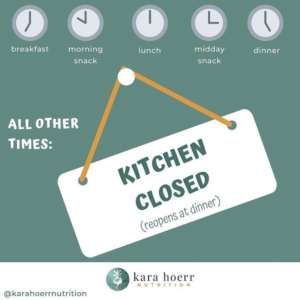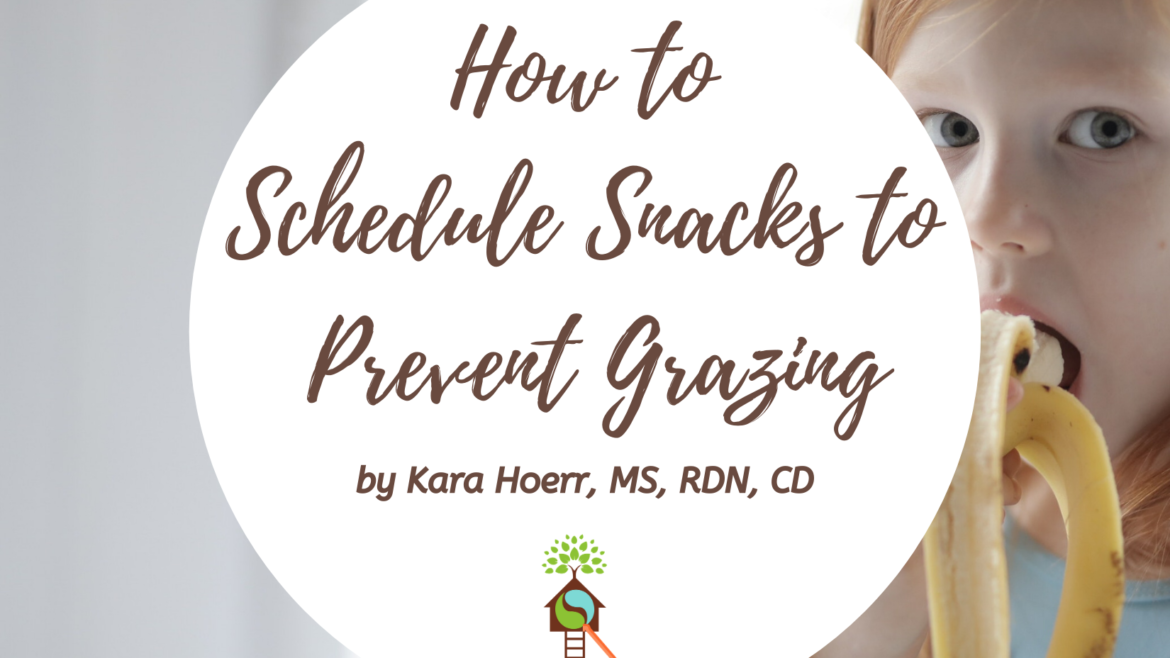Scheduling Snacks To Prevent Grazing
by Kara Hoerr, MS, RDN, CD
“Can I have a snack?” Anybody else hear this on repeat every day right now? With kids around all the time, the snacks seem to disappear into thin air. You’re not alone if you feel like you’re constantly in the kitchen either preparing a meal or more snacks. And when you’re not in the kitchen, you have somebody requesting a snack!
Snacks can be a great way to fill in the gaps between meals and prevent hunger from dipping too low. I like to think of them as a mini-meal, providing at least 2–3 food groups that help meet you or your child’s nutritional needs.
While snacks are important and needed, unscheduled snacks can blur into grazing. Rather than snacks being used as a way to nourish and satisfy hunger, it’s easy for them to become a way to appease kids in the moment. When a toddler is starting to get fussy, an applesauce pouch gets pulled out. When you’re stuck inside at home and your kiddo complains of being bored and asks for a snack, a granola bar is handed over. Sure, giving snacks may work in the short term—your child is now quiet and appears to be content in front of the iPad with veggie straws or wandering around the house with a container of Cheerios.
Of course, there are times when a snack is needed, but when snacks are handed out on demand, the long-term effect of grazing can be more detrimental than helpful.
Grazing or constant snacking prevents kids (and adults) from recognizing what it feels like to be hungry, eat, and then feel full. This rhythm of eating and self-regulation is important in being an intuitive eater, or one who listens to his internal cues for when to start and stop eating rather than external reasons. Kids who never really experience their internal hunger and fullness cues are more likely to eat mindlessly and form an unhealthy relationship with food.
When we graze, we’re usually not just eating like we would be if we were eating a meal. We’re eating while doing something else. Our awareness to the food we’re eating is limited and the distractions are high. This can make it easy to eat past our internal fullness. For kids, it also means they’re not watching how the adults around them are eating and are not getting that valuable time to practice social skills and experiences. How kids approach food is very much influenced by what and how they see others eating. If they’re distracted or not at the table to do this, they’re not able to get that positive influence you have to offer when it comes to food.
In the end, it all comes down to how you structure your meals and snacks. If you’re wondering why your child isn’t eating well at meals, it may be the snacks! By the time dinner comes, your child has lost his appetite. This not only can make for a stressful eating experience at dinner, it also means your child may be missing out on more balanced food options. Snack options are often limited to cold and dry items and, while these can still be nutritious, grazing limits the variety of foods, textures, and flavors a kid is exposed to.

The solution is as simple (but not necessarily easy!) as scheduling snacks and meals into your child’s day. Stand firm and let your child know that the kitchen is closed in between meals and snacks, but reassure him that more food will be coming again soon. With time, your child will start to recognize his hunger and fullness cues again and learn that he needs to eat adequate amounts at the scheduled meals and snacks.
A parent’s responsibility is to set the time and place of meals and the child’s job is to decide how much they’re going to eat of what’s being offered. When a child is being given snacks on demand, this disrupts the feeding relationship and can lead to struggle after struggle in the future. But, when your child understands that a simple request for a snack after dinner won’t be granted (unless it’s already been scheduled in), he’ll come to dinner hungry and be more willing to try to the foods at the table.
So, if you’re tired of all the snacks, try out a schedule with planned snack time at the table. You’ll be fostering a long-lasting positive relationship with food for your kids and less stressful meals for the entire family. That’s a win-win!

Kara Hoerr, MS, RDN, CD, is a registered dietitian nutritionist and owner of Kara Hoerr Nutrition where she provides 1:1 nutrition coaching for families. To learn more or to set up a free discovery call, visit www.karahoerrnutrition.com, email Kara at kara@karahoerrnutrition.com, or call 608-620-4461.
This information is not intended as medical advice. Please consult a medical professional for individual advice.



